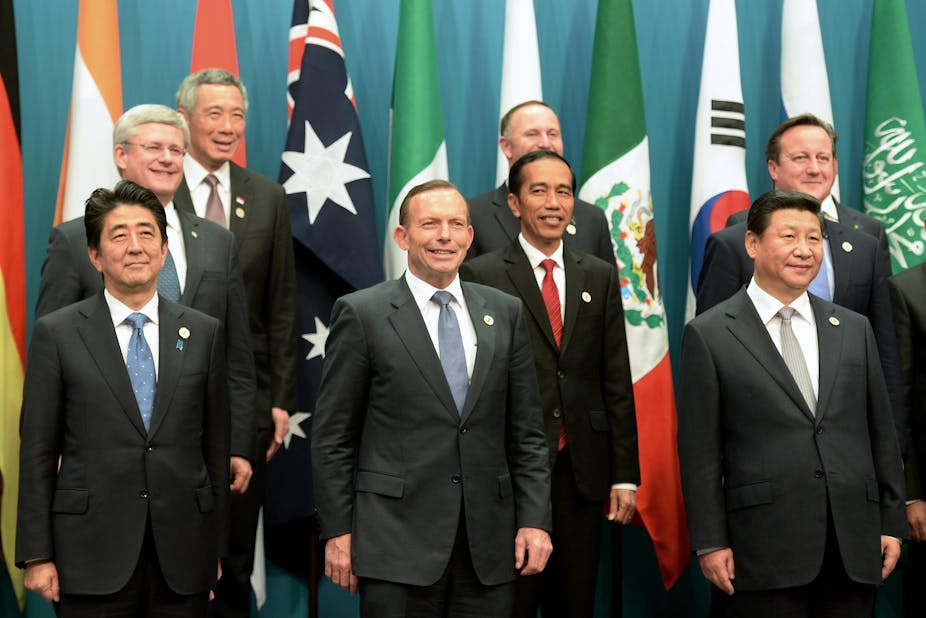There’s nothing quite like being the centre of attention, even if it costs A$400 million to do so. Now that the curtain has come down on Australia’s moment in the diplomatic spotlight, taxpayers might reasonably ask what we’ve got to show for hosting the G20 and the greatest collection of the world’s political movers and shakers we’ve seen in this country.
Whether this event marks the sort of watershed moment some seem to think will only become clear over the next few years. Undoubtedly, there are some impressive outcomes, even if one of the most potentially consequential – the free trade deal with China – is the result of years of painstaking bilateral negotiations, not a sudden epiphany on Xi Jinping’s part after a bout of koala cuddling.
The good news is Xi seems to like us, or he does judging by his carefully calibrated remarks to the Australian parliament, at least. The idea that China and Australia should develop a comprehensive strategic partnership is a bold one, and one that some will undoubtedly see as an effort by China to dilute Australia’s strategic ties to the US.
Perhaps it is. Even so, it is something that Australia ought to embrace. If Australia does actually have a clear cut sense of national interest, it surely revolves around having good relations with our number one trading partner and the principal influence on our future collective economic welfare.
Despite some missteps over China’s proposed infrastructure bank and premature celebrations about the course of democratic reform in the People’s Republic, the Abbott government clearly recognises China’s economic importance. But this has not stopped it simultaneously conducting a strategic dialogue with the usual suspects – the US and Japan.
Yet many observers have also noted the striking contrast between the rhetoric employed by Xi and Barack Obama in their respective set piece speeches during their visits. Xi was charm and reassurance personified, while Obama took the opportunity to pursue his own agenda with little regard for its impact on his host. So much for all that effort currying favour with great and powerful friends.
Some may say that Tony Abbott only had himself to blame for trying to shut down debate on climate change which is – or ought to be – the most important item on any international agenda. That it came to dominate the debate anyway is a reminder of where the real power in world affairs still lies: the potentially much more effective and consequential G2 – China and the US – made the running on a bilateral basis and everyone else had to fall into line.
Such an outcome will not surprise those readers of a more realist bent. It may still be the way of the world, perhaps, but it begs the question of quite what the purpose of a potentially more inclusive grouping like the G20 actually is. Was anything new actually achieved that wouldn’t have occurred otherwise? What influence can so-called middle powers like Australia actually exert in shaping the international agenda?
The great potential attraction of multilateralism is that it necessarily diffuses power. If there is a genuinely open-ended discussion of key issues like climate change or – more appropriately in the G20’s case, perhaps, financial sector reform – and a commitment to develop collaborative, binding policy outcomes, then the great and the not-so-great-powers will be equally constrained.
This is also why – other than at moments of profound crisis – the basis for deals and agreements is mapped out well in advance by the lesser lights of international diplomacy. No-one likes being ambushed, surprised or hectored, which may explain why Vladimir Putin went home early, apparently in a huff. Given that he’s a sour puss at the best of times, though, it’s a bit hard to tell.
The unexpectedly cool relations with the US also explain why an otherwise productive series of international encounters was not the unalloyed triumph Abbott may have hoped for. It was equally discombobulating for some of the Murdoch empire’s hacks, too. Which is the least worst option – saying something critical about the alliance, or seeming to give tacit support for Obama and his criticism of Australia’s environmental policies?
So has Australia announced its presence on the global stage as core Indo-Pacific power as some would like to believe? Up to a point, perhaps. Certainly much of the region relies on what we can dig from the ground, and we can always be relied upon to provide a convenient place to establish military bases and listening posts, but there’s nothing new in any of that.
Can we translate any of this potential leverage into an effective, even a distinctively Australian foreign policy perspective? Time will tell, but to judge from the last 50 years or so, the omens are not good. Next time the diplomatic jamboree comes to town we won’t be the hosts, and we’ll once again be relegated to the back row of the photo ops.
Look on the bright side though, at least we won’t be paying for it.

